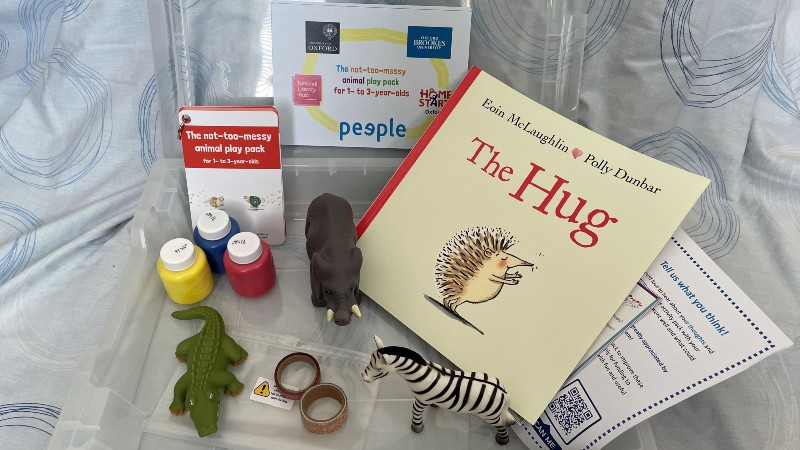Researchers work with charities to offer free activity packs, supporting interaction with children

A team of experts, including an Oxford Brookes University researcher, have teamed up with three charities to offer free resource packs which include activities that parents can do with their babies or toddlers.
Dr Nayeli Gonzalez-Gomez, Senior Lecturer in Psychology at Oxford Brookes, joined experts from five UK universities, including Dr Alex Hendry of the University of Oxford, to research the development of young children during the pandemic, beginning in spring 2020.
The research indicated that parents who spent more time with their child engaging in different enriching activities such as reading, arts and crafts, exercise and cooking, reported that their child had stronger thinking skills. This included their ability to hold information, respond to their surroundings and work towards goals.
High screen use was linked to poorer thinking and emotional regulation skills. Thinking and regulation skills are both very important to a child’s long term mental development and academic abilities.
It was also discovered that during both the spring and winter 2020 lockdowns, children from less privileged backgrounds spent less time doing enriching activities, but more time using screens. This suggested that the closure of libraries and playgrounds during the first lockdown had a larger impact on less privileged families.
Following this, Dr Nayeli and Dr Hendry organised a series of online workshops with parents and early year practitioners, with the aim of finding out what the barriers were for parents’ interactions with their young children.
Free activity packs have now been produced in collaboration with three charities in Oxfordshire. They include advice on ten activities for children aged three and under - all aimed at supporting their development.
Dr Nayeli said: “We know that children depend on high-quality interactions to support all aspects of their development. We hope that these activity packs will help parents to build up their confidence and give them lots of opportunities to spend quality one-to-one time with their children.”
Dr Hendry commented: “Parents are doing a fantastic job in really difficult circumstances at the moment. However, what came up in our workshops, again and again, is that many parents don’t have the time, space or confidence to do long, complicated activities with their children – and very young children often aren’t interested in those kinds of activities anyway. What parents need are ideas for simple, fun activities that don’t take ages to set up or clear up.”
With support from book publisher ‘Faber’ and an ESRC Impact Accelaration Grant, the experts joined charities National Literacy Trust, Peeple, and Home-Start Oxford to create the two free activity packs for families. The packs included a book, craft materials and ideas for how best to use them. These packs are distributed to children’s centres across Oxford, as well as other organisations that work with families and children.
Sally Smith, CEO of Peeple, who helped to create the resources, said, “We are delighted to be able to share these packs with families at our Peep group sessions, and via our nursery, Little Peeple. They will really support parents to have fun with their children – and do more of the little things which make a big difference to their child’s learning and development!
The research paper, titled ‘Not all babies are in the same boat: Exploring the effects of socioeconomic status, parental attitudes, and activities during the 2020 Covid-19 pandemic on early Executive Functions’, is published in ‘Infancy’.
The paper is authored by Alexandra Hendry (University of Oxford), Shannon P. Gibson (Oxford Brookes University), Catherine Davies (University of Leeds), Teodora Gliga (University of East Anglia), Michelle McGillon (University of Warwick), Nayeli Gonzalez-Gomez (Oxford Brookes University).
Not all babies are in the same boat: Exploring the effects of socioeconomic status, parental attitudes, and activities during the 2020 Covid-19 pandemic on early Executive Functions
Image credited to Peeple
